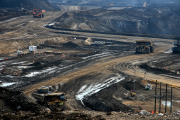Let's say one of the best economic analysis firms in Canada is commissioned to calculate the economic consequences of tackling climate change. A report is published that one of Canada's leading economists calls "robust." And it shows that Canada can meet an ambitious national emissions target while growing its economy by over 20 per cent and creating nearly two million net new jobs.
Most of us would call that good news. But Canada's environment minister, Jim Prentice, had a different response when the Pembina Institute and the David Suzuki Foundation published exactly that analysis last week: he called it "irresponsible" and "divisive." Alberta Premier Ed Stelmach wants Ottawa to ignore the report, according to an article published in this newspaper. What is behind the fearful responses from elected officials?
In short, they're worried about protecting "business as usual." Our analysis shows that Alberta will continue to lead the nation in GDP growth at 3.3 per cent per year - but that this happens more slowly under our scenario than it would under business as usual conditions. Alberta would still comfortably exceed 2 million barrels per day of oilsands production by 2020, and would create 133,000 net new jobs. But in the place of unfettered oilsands expansion, the industry would grow at a more measured pace, and companies would build in emission control technology like carbon capture and storage.
What Alberta needs is "good growth," not growth that is inherently unsustainable and ignores serious global issues and concerns. Our analysis shows economic growth in Alberta is projected to be 38 per cent between 2010 and 2020 while reducing emissions in line with the 2°C global warming limit endorsed by the G8+5 countries. Alberta's over-heated growth rate of 43 per cent between 1998 and 2008 was widely seen as unsustainable and unhealthy.
As a province that is currently reliant on high-polluting energy sources, such as coal-fired electricity, Albertans will face higher energy costs in the interim until we transition to cleaner sources of energy. That's why our analysis included a measure that would provide individual Albertans with $940 per year to compensate them for higher household energy costs, using government revenues collected from polluters. As a result, the vast majority of the revenue raised from the policies we propose would stay in Alberta. This is far from the "wealth transfer" that Premier Stelmach worried about, and it's exactly the type of measure that governments would adopt to reduce concerns about regional disparities as our economies evolve to become cleaner and more efficient.
So Canada and Alberta can grow and prosper while cutting emissions, but not quite as much as they would if we ignored climate change altogether and proceeded with "business as usual."
In light of that, it's worth taking a moment to consider the notion of "business as usual." As Albertans, let's not forget what it was like living and working here during the boom.
Suffering from an overheated economy, we experienced high costs for housing, infrastructure and basic services. We created jobs faster than skilled employees could fill them, and a strained labour market drove up costs, diminished productivity, and burned out employees. Our economy began to hollow out as industries and businesses fled because they simply couldn't compete. Kids dropped out of school in response to the allure of high-wage labour jobs. Some people rightly observed that our economy was eroding from the bottom up.
Such an unsustainable rate of economic growth led people like former premier Peter Lougheed and St. Paul Bishop Luc Bouchard to call for a moderated pace of oil sands development on economic, social, environmental and even moral grounds. We have experienced first hand that faster growth isn't necessarily better.
Oilsands development in Alberta has become the fastest growing source of global warming pollution in Canada. So it is not surprising that many Albertans worry about the challenge of reconciling our desire for healthy communities and a safe environment with a prosperous economy. Our economic analysis shows that we can achieve this balance, but only if our political leaders muster the courage to move from fear-based rhetoric to serious action.
Alberta doesn't have to settle for "business as usual." We have a choice in this province: take control of our own destiny and lead, or be dragged into the future by forces beyond our control.
Dan Woynillowicz is a senior policy analyst with the Pembina Institute. A copy of the report Climate Leadership, Economic Prosperity can be downloaded at www.pembina.org/pub/1909.





